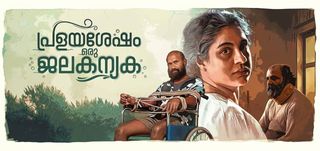
Neelathamara Movie Review
Art often withstands the tests of time, unlike the artists themselves. Which is why there are stories that are retold, cinema that is remade and music that is recomposed as tributes to its original craftsmen.
But not every tale has the facility to rejuvenate the viewer's interest, a good thirty years since it was originally written. Times change, so do people, aptitudes change, so do attitudes. What I am trying to say is it's 2009, and the Blue lotus seems to have bloomed quite late into the day.
The master scriptwriter MT's script for Neelathamara must have been a startling revelation back in the 1970's. It had all the things going for it when it comes to human drama, and had its heart right in its place. But there is very little of the 70's that still belong here; and hence we reverently listen to the story not because we really want to, but because it's one that had been held close to their hearts by a generation of cinephiles a good thirty years back.
Neelathamara is an absolute symbol of faith in the film, and the blue water lily that blooms when Kunjimaalu (Archana) prays before the Thevar, signifies more than just an optimism of the housemaid. She is hopelessly in love with Haridas (Kailash), son of Maalukuttiyamma (Sreedevi Unni) whom she works for, and who has seduced her beyond her wits. She soon succumbs to his charm and ends up on his bed, while he moves ahead with his life and marries Ratnam (Samvrutha).
So this is a story that is as familiar to us as the back of our palms, and its here that Lal Jose comes to our rescue. A man who clearly knows how the script works, Lal Jose has brilliantly adapted this age old story to the new screen, efficiently trimming off the frayed ends, and working up a brilliant visualization that makes him the master director that he is. Nevertheless, the story that remains as old as the hills bogs him down time and again.
Neelathamara runs the risk of degenerating into a tear jerker, and surprisingly it doesn't. Kunjimaalu quickly comes to terms with the changed state of affairs, and goes about with her business without much ado. It has to be noted that there are no confrontation scenes between Kunjimaalu and Haridas, post his marriage and this does help in keeping the pressure off the air. I do have a reservation regarding this though, because perhaps it would have made no difference even if they had met again, since Kunjimaalu seems to have resigned to her fate already.
The three female characters in Neelathamara offer an excellent study in contrast. Kunjimaalu around which the entire film revolves is perhaps the weakest caricature of the three, and soon offers an explanation when she says that girls like her do not have to take decisions. The world takes them for her, as it happens in the film, and she moves along with the flow and lands where the current drops her off.
Shaarathe Ammini (Reema) is the neighborhood girl who keeps talking of her sister and her family; perhaps an allusion to her shattered dreams of having a family of her own. Princes do not alight from the clouds; she tells Kunjimaalu, and the tragic end that she meets with is suggestive of some depressive syndrome that she has been suffering from.
Ratnam is perhaps the only woman in the film who could be attributed with some verve. She doesn't let her shocking discovery unsettle her life; she neither hesitates before meeting her husband head-on with her finding. There is no hanging on to the truth; she lets go with equal efficiency and reassembles the bits and pieces around her to restructure her story. She is never judgmental with Kunjimaalu either, there is no envious loathing or revulsion and just a deep sense of understanding in its place. A good thirty years later, Ratnam is hence the one in Neelathamara who doesn't seem out of place and time.
Kailash is my pick of the lot, when it comes to the performers in the film. He is as much a hot blooded, charismatic and flirtatious youngster of the 70's as one can be. Confident and remarkably talented, this young actor is one who would be around for a long time to come. Archana is every bit the demure, coy village girl and the innocent sweetheart. Samvrutha puts up a starkly moving performance that should count among the best that she has come up with till now in her career.
Lal Jose is the man when it comes to creating verse on screen. Beautifully shot, Neelathamara has been conceptualized with an effervescent artistry. Vijay Ulakanathan's camera work is nothing short of brilliant. The three songs that have been set to tune by Vidyasagar are mind blowingly melodious to say the least.
Neelathamara does make an effort to wedge itself into today's world. And I would grant it to Lal Jose and his team for having done the best with a theme that felt right three decades back.



















